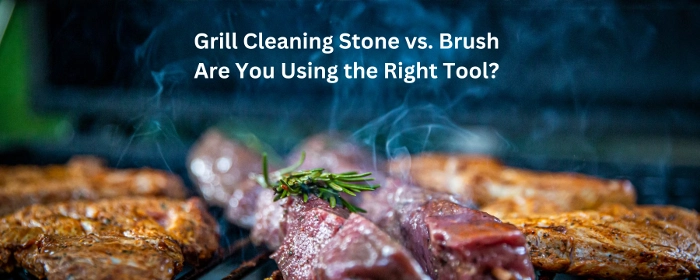Grill Cleaning Stone vs. Brush - Are You Using the Right Tool?

-
Grill Cleaning: Stone vs. Brush - Which Works Better?
- Grill Cleaning Stone: The Pros and Cons
- Grill Brush: A Staple in Grill Maintenance
- Comparing Effectiveness and Ease of Use
- Considerations for Grill Surface and Maintenance Routine
- Conclusion
Grill Cleaning: Stone vs. Brush - Which Works Better?
In the realm of grill maintenance, choosing the right cleaning tool can make all the difference.
Two popular options that often come into play are the grill cleaning stone and brush.
But which one is more effective?
Join us as we compare these two tools to help you determine the best choice for your grill cleaning needs.
Read Next: In the Ring: Grill Cleaning Spray vs. Wooden Scraper - Your Pick?
Grill Cleaning Stone: The Pros and Cons
Grill cleaning stones, typically made from porous materials like pumice or volcanic rock, offer a unique approach to grill cleaning.
Their rough surface is designed to scrape away tough residue, making them effective for tackling stubborn grease and grime.
However, while they excel at removing buildup, there are some considerations to keep in mind.
For instance, they may not be suitable for all grill surfaces and can potentially cause scratching or damage if used improperly.
Grill Brush: A Staple in Grill Maintenance
On the other hand, grill brushes have long been a staple in grill maintenance kits.
With their sturdy bristles and ergonomic design, they make quick work of removing debris from grill grates.
Unlike grill cleaning stones, brushes are versatile and can be used on a variety of grill surfaces without the risk of damage.
However, they may struggle with particularly stubborn residue and may require more effort to achieve the desired results.
Comparing Effectiveness and Ease of Use
When it comes to effectiveness, both grill cleaning stones and brushes have their strengths.
Stones excel at removing tough buildup, while brushes offer versatility and ease of use.
The choice ultimately depends on your cleaning preferences and the condition of your grill.
If you're dealing with heavy residue, a grill cleaning stone may be the better option.
However, for regular maintenance and general cleaning, a brush may suffice.
Considerations for Grill Surface and Maintenance Routine
Before making a decision, consider factors such as the material of your grill grates and your cleaning routine.
Porcelain-coated grates, for example, may be more susceptible to scratching and damage from grill cleaning stones, whereas stainless steel grates can withstand more abrasive cleaning methods.
Additionally, assess your cleaning frequency and the level of buildup on your grill.
For occasional deep cleans, a grill cleaning stone may be beneficial, while a brush is ideal for regular maintenance.
Read Next: What to Look for When Buying a Grill Cleaning Sponge
Conclusion
In the debate between grill cleaning stone vs. brush, there's no one-size-fits-all answer.
Both tools have their merits and can be effective depending on your specific cleaning needs and grill surface.
Experiment with both options to determine which works best for you.
Additionally, consider incorporating our Easy Function wood grill scraper into your cleaning routine.
Crafted from pine wood with a scalloped blade and backed by a lifetime warranty, it offers an eco-friendly and efficient solution for post-cooking care.
Its unique design conforms to grill shapes over time, reducing the number of scraping sessions required while ensuring a hassle-free cleaning experience.
Give it a try alongside your preferred cleaning tool for perfectly maintained grill grates with ease and efficiency.
Check out our wooden grill scraper on Amazon USA
Check out our wooden grill scraper on Amazon Canada
P.S. - Want to try something fun on your grill? Read The Easiest Guide To Cooking Pizza On The Grill With A Stone! to learn how to get a crispy crust and make the most of your clean grill surface.
-
Grill Cleaning: Stone vs. Brush - Which Works Better?
- Grill Cleaning Stone: The Pros and Cons
- Grill Brush: A Staple in Grill Maintenance
- Comparing Effectiveness and Ease of Use
- Considerations for Grill Surface and Maintenance Routine
- Conclusion